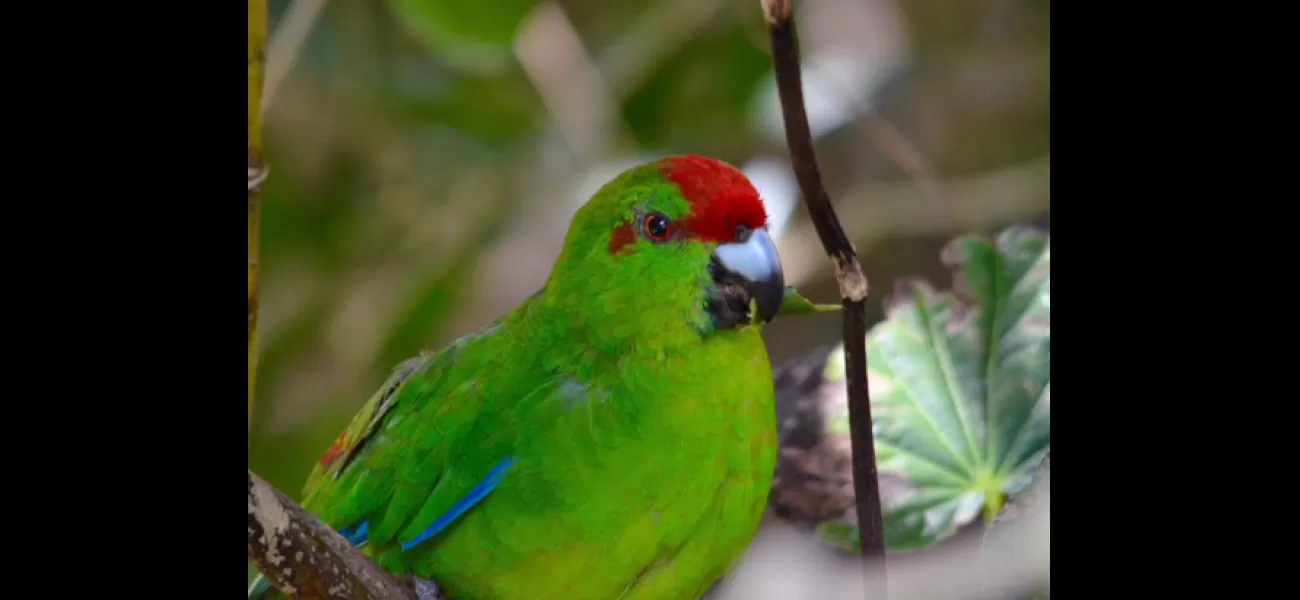Parrots are getting intoxicated by eating foul-smelling tree bark scraps.
The birds seem to be enjoying themselves a bit too much.
June 24th 2024.

Humans have long been fascinated by the behaviors and habits of animals, especially those that seem to mirror our own. One such example is the Norfolk Island green parrot, a unique species found only on the island of Norfolk. Recent observations have shown that these parrots may be engaging in more than just grooming when applying chewed pepper tree bark and shoots to their feathers and skin.
Researchers have long known that the pungent chemical, piperine, found in these trees acts as a natural insect repellent. The parrots, known for their meticulous grooming habits, may have discovered an added benefit to using the tree's bark and shoots - getting high. In a study published in the journal Austral Ecology, researchers noted that the parrots appeared to be enjoying themselves a bit too much during their grooming sessions.
On two separate occasions, the researchers observed the parrots actively seeking out and applying the bark and shoots to their feathers. Some even went as far as placing the leaves between their feathers, almost as if self-medicating. This behavior, known as "anting," is not uncommon in birds, but the use of plant material for this purpose is quite rare.
The birds' actions not only serve to repel insects and parasites, but also potentially improve their overall fitness. By mixing the piperine with the preen oil from their uropygial gland, the parrots create a potent combination that not only cleanses their feathers but also provides a natural defense against pesky parasites.
Dr Penny Olson, the study's first author, suggests that this behavior could also tap into the birds' pleasure centers. In an article for The Conversation, she writes, "Nature rewards behavior that offers evolutionary advantage, often, it seems by tapping into animals' pleasure centers." In this case, the pursuit of pleasure may also serve a practical purpose for these parrots.
Aside from their unique grooming habits, the Norfolk Island green parrot is known for its limited population and potential risk of extinction. With only an estimated 240 birds left in the wild, conservation efforts have been put in place to protect this endemic species. And while the idea of these parrots getting high off smelly trees may seem amusing, it serves as a reminder of the importance of understanding and protecting all forms of life on our planet.
Researchers have long known that the pungent chemical, piperine, found in these trees acts as a natural insect repellent. The parrots, known for their meticulous grooming habits, may have discovered an added benefit to using the tree's bark and shoots - getting high. In a study published in the journal Austral Ecology, researchers noted that the parrots appeared to be enjoying themselves a bit too much during their grooming sessions.
On two separate occasions, the researchers observed the parrots actively seeking out and applying the bark and shoots to their feathers. Some even went as far as placing the leaves between their feathers, almost as if self-medicating. This behavior, known as "anting," is not uncommon in birds, but the use of plant material for this purpose is quite rare.
The birds' actions not only serve to repel insects and parasites, but also potentially improve their overall fitness. By mixing the piperine with the preen oil from their uropygial gland, the parrots create a potent combination that not only cleanses their feathers but also provides a natural defense against pesky parasites.
Dr Penny Olson, the study's first author, suggests that this behavior could also tap into the birds' pleasure centers. In an article for The Conversation, she writes, "Nature rewards behavior that offers evolutionary advantage, often, it seems by tapping into animals' pleasure centers." In this case, the pursuit of pleasure may also serve a practical purpose for these parrots.
Aside from their unique grooming habits, the Norfolk Island green parrot is known for its limited population and potential risk of extinction. With only an estimated 240 birds left in the wild, conservation efforts have been put in place to protect this endemic species. And while the idea of these parrots getting high off smelly trees may seem amusing, it serves as a reminder of the importance of understanding and protecting all forms of life on our planet.
[This article has been trending online recently and has been generated with AI. Your feed is customized.]
[Generative AI is experimental.]
0
0
Submit Comment





